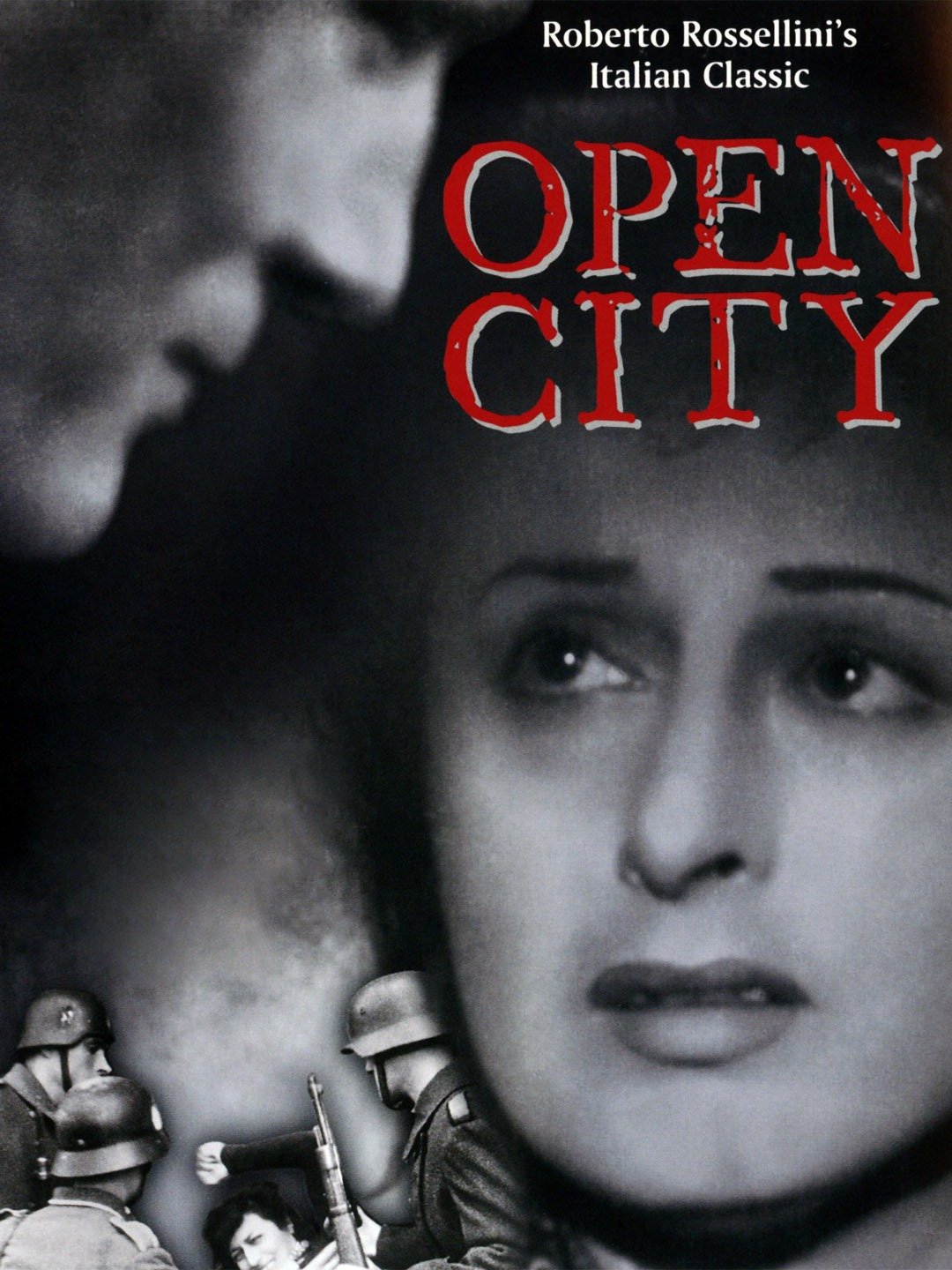
OPEN CITY (ROMA, CITTA APERTA)
(director: Roberto Rossellini; screenwriters: Federico Fellini/Sergio Amedei; cinematography: Ubaldo Arata; editor: Eraldo De Roma; cast: Anna Magnani (Pina), Aldo Fabrizi (Priest, Don Pietro), Marcello Pagliero (Luigi Ferrari/Giorgio Manfredi), Maria Michi (Marina), Henry Feist (Major Bergmann), Vito Annichiarico (Marcello, Pina’s Son), Eduardo Passarelli (The Neighborhood Police Sergeant), Carla Rovere (Lauretta), Francesco Grandjacquet (Francesco), Giovanna Galletti (Ingrid), Nando Bruno (Agostino, Sexton), Ákos Tolnay (Austrian Deserter); Runtime: 101; Excelsa; 1946-Italy)
“It is still a work of considerable merit.”
Reviewed by Dennis Schwartz
Filmed in the harsh conditions of 1945 Rome, when Italy was just liberated from the German occupation, where a movie such as “Open City” was not a priority in the postwar period. All the country’s money was needed to rebuilt its infra structure, as movies seemed a frivolous activity at the time. Rossellini used poor film stock leftover from the fascist regime and filmed despite all the technical deficiencies he ran into. He came up with a gritty, authentic looking film, a grim story of survival and the fight for freedom. This was a breakthrough film for the director, whose neorealist style, using a Hollywood type of narrative and a documentary style approach to filming, caught the dire mood of the Resistance Movement and the ordinary people who fought the fascists. It is a melodramatic story about good versus evil. The poor, suffering, hardworking people being the good ones; and, those who sold their soul for money, luxury, vice, betrayal, or false ideals, being the evil ones. It also showed how the Resistance fighters were members of the Communist party and were atheists while their sometime partners, the Catholic church, were their opposite but still sided with them due to the horrible suffering the people faced.
Awards such as the New York Film Critics Circle and Best Film in Cannes in 1946, came to this film. It awakened an international audience to the knowledge that Italian cinema was alive and well and Roberto Rossellini was a director to be reckoned with, along with De Sica, who just filmed “Shoe Shine” in the neorealist style, also, to international acclaim.
Idealistic Resistance leader Manfredi (Pagliero) is on the run, his group got word that there is an informer among them. He goes to the apartment of a sympathizer, Francesco (Grandjacquet), who can help the cause through his trade as a printer, as he transfers money into a book for shipment to those Resistance fighters in the field. But since Manfredi can’t go himself to carry out this assignment, he asks for help. Francesco’s pregnant girlfriend lives next door to him, Pina (Magnani). She lives in poverty with her extended family and her young son Marcello (Vito) and a sister Lauretta (Carla), who is aspiring to be an actress and is ashamed of her impoverished family. The widow Pina is earthy and the quintessence of Italian femininity, plus she’s a nurturing mother. She believes in God and is ashamed she became pregnant before getting married, but is happy that she will marry Francesco tomorrow. She returns with a bag full of bakery items, as her neighbors looted the bakery. When asked by Manfredi, she sends her son to get the local priest, Don Pietro (Fabrizi), to come over, who is sympathetic to the Resistance Movement, and he agrees to take the dangerous assignment.
Manfredi has been fooling around with an attractive but insincere actress, Marina (Michi), a friend of Lauretta’s. But he finds her thirst for money to be something he can’t live with anymore, and tries to get word to her that he wants to breakup.
Warning: spoilers in next two paragraphs.
The Gestapo, under a particularly malevolent Major Bergmann (Feist), raids Pina’s building and brings in Francesco for routine questioning on his wedding day. Pina is alarmed by this and runs in the street after him, but gets shot down by the Nazis. When Francesco is released, he joins Manfredi in Marina’s luxurious apartment, as they are desperate for a place to stay. She overhears them talking about meeting the priest and turns this information over to the major’s cold-hearted assistant Ingrid (Giovanna Galletti), who plies Marina with clothes, theater work, and money. The information proves correct and they capture the priest, Manfredi, and a deserting Austrian soldier (Ákos Tolnay), as the priest supplied him with false I.D. cards to escape the country.
In a very brutal conclusion, Manfredi is tortured to get information; while, the deserter can’t take the punishment and hangs himself. The priest is executed by a firing squad. The film has an immediacy, but was also overly melodramatic; it relied so much on the premise that there is no such a race as a master race. That Manfredi dies without talking after being tortured makes his heroics larger than anyone else’s and proves that the Italians are every bit as good as the Germans, if not better. Rossellini hoped to examine the Italian soul and show that there were both good and bad people among them, while the Germans have gone so far off the edge of sanity that it is hard to find a good German because of their perverse beliefs.
Anna Magnani gives the film credibility through her the humanity shown in her performance. Her story is filled with her heartfelt yearnings. The other professional actor to standout, among all the nonprofessionals, was Aldo Fabrizi in the priest role. He elicited a call for humanity, for all people to act as brothers. Though, the film does not seem as relevant as it was when first released and acclaimed a masterpiece, having lost some of its purity; nevertheless, it still retains its moral high ground and its ability to show the collective will of the people who resisted. It is still a work of considerable merit.
REVIEWED ON 9/3/2000 GRADE: B